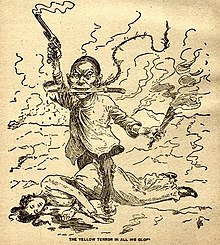| Fin de siècle |
|---|
 |

The Yellow Peril (also the Yellow Terror, the Yellow Menace, and the Yellow Specter) is a racist color metaphor that depicts the peoples of East and Southeast Asia[a] as an existential danger to the Western world.[2]
The concept of the Yellow Peril derives from a "core imagery of apes, lesser men, primitives, children, madmen, and beings who possessed special powers",[3] which developed during the 19th century as Western imperialist expansion adduced East Asians as the Yellow Peril.[4][5] In the late 19th century, the Russian sociologist Jacques Novikow coined the term in the essay "Le Péril Jaune" ("The Yellow Peril", 1897), which Kaiser Wilhelm II (r. 1888–1918) used to encourage the European empires to invade, conquer, and colonize China.[6] To that end, using the Yellow Peril ideology, the Kaiser portrayed the Japanese and the Asian victory against the Russians in the Russo-Japanese War (1904–1905) as an Asian racial threat to white Western Europe, and also exposes China and Japan as an alliance to conquer, subjugate, and enslave the Western world.
The sinologist Wing-Fai Leung explained the origins of the term and the racialist ideology: "The phrase yellow peril (sometimes yellow terror or yellow specter) ... blends Western anxieties about sex, racist fears of the alien Other, and the Spenglerian belief that the West will become outnumbered and enslaved by the East."[7] The academic Gina Marchetti identified the psycho-cultural fear of East Asians as "rooted in medieval fears of Genghis Khan and the Mongol invasions of Europe [1236–1291], the Yellow Peril combines racist terror of alien cultures, sexual anxieties, and the belief that the West will be overpowered and enveloped, by the irresistible, dark, occult forces of the East";[8]: 2 hence, to oppose Japanese imperial militarism, the West expanded the Yellow Peril ideology to include the Japanese people. Moreover, in the late-19th and early-20th centuries, writers developed the Yellow Peril literary topos into codified, racialist motifs of narration, especially in stories and novels of ethnic conflict in the genres of invasion literature, adventure fiction, and science fiction.[9][10]
- ^ "Yellow Terror in all His Glory". Ohio State University. Retrieved 13 June 2020.
- ^ Odijie, Michael (2018). "The Fear of 'Yellow Peril' and the Emergence of European Federalist Movement". The International History Review. 40 (2): 359. doi:10.1080/07075332.2017.1329751. S2CID 158011865.
- ^ Dower, John W. (1986). War Without Mercy: Race and Power in the Pacific War. New York: Pantheon. pp. 3–13. ISBN 978-0394751726.
- ^ Yang, Tim (19 February 2004). "The Malleable Yet Undying Nature of the Yellow Peril". Dartmouth College. Archived from the original on 2 January 2015. Retrieved 18 December 2014.
- ^ Dower, John. "Patterns of a Race War" pp. 283–287, in Yellow Peril! An Archive of Anti-Asian Fear, John Kuo Wei Tchen & Dylan Yeats, Eds. London: Verso, 2014 pp. 285–286.
- ^ John Röhl. The Kaiser and His Court: Wilhelm II and the Government of Germany, Cambridge University Press, 1994. p. 203.
- ^ Leung, Wing Fai (16 August 2014). "Perceptions of the East – Yellow Peril: An Archive of Anti-Asian Fear". The Irish Times. Archived from the original on 29 August 2014. Retrieved 4 January 2015.
- ^ Cite error: The named reference
Marchetti 1994was invoked but never defined (see the help page). - ^ Cite error: The named reference
:0was invoked but never defined (see the help page). - ^ A Handbook to Literature, 4th ed. (1980), C. Hugh Holman, Ed., pp. 444–445, 278–279.
Cite error: There are <ref group=lower-alpha> tags or {{efn}} templates on this page, but the references will not show without a {{reflist|group=lower-alpha}} template or {{notelist}} template (see the help page).